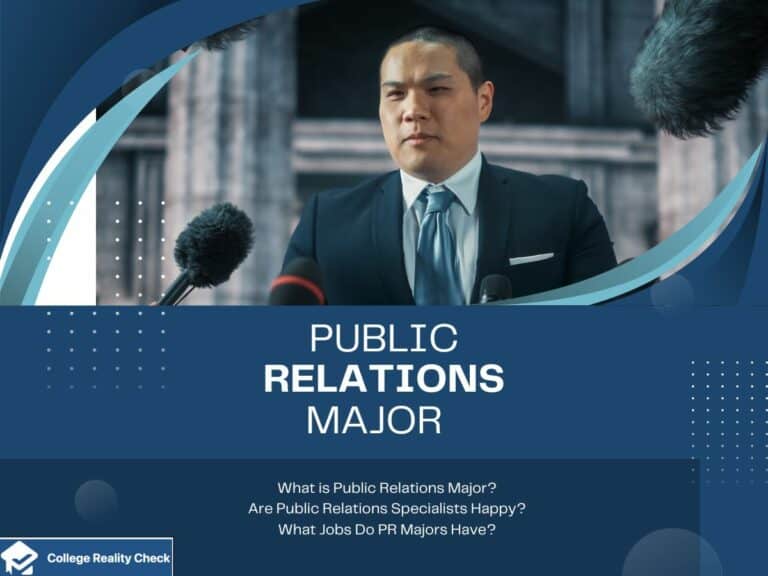Majoring in Japanese: Myths vs. Facts
So, you love things like anime and manga as well as food like sushi and ramen. And this is why you are open to the idea of migrating to Japan one day. Does this mean that Japanese is a good college major for you?
Majoring in Japanese is good for degree-seeking students who want to achieve competitiveness in the global job market. It’s a particularly ideal major for individuals who consider working and living in Japan, where less than a third of the entire population can speak English, an option after graduation.
Read on before deciding on placing Japanese at the top of your college major list.
In this post, we will discuss some of the most important things about enrolling in a bachelor’s program in either Japanese studies or Japanese language and literature as well as the possible career options you may take afterward.

Who Should Major in Japanese?
Students who want to work on a bachelor’s degree while obtaining a strong understanding not only of the Japanese language but also of Japan’s history, culture, geography, religion, economics, politics, and arts and culture should consider enrolling in Japanese studies or Japanese language and literature program.
Based on a Foreign Policy report, it is estimated that only less than 30% of Japanese speak English. As a matter of fact, it is estimated, too, that as little as 2% of them speak fluent English.
Still, there are many US companies operating in Japan, and some of them include:
- 3M
- Abbott Laboratories
- AMETEK Inc.
- Amway International
- Apple Inc.
- Baxter International
- Caterpillar Inc.
- Coca-Cola Company
- General Electric
- Hallmark Cards Inc.
- Hewlett-Packard
- Hyatt Hotels Corporation
- Johnson & Johnson
- Kraft Foods
- Marriott International Inc.
- Microsoft Corporation
- Polaroid Corporation
- Starwood Hotels and Resorts Worldwide
- Texas Instruments
- Zippo Manufacturing Company
If your career goal is to work in Japan for a US company, then majoring in Japanese can be a huge plus.
But you can also get your hands on a bachelor’s in Japanese studies or Japanese language and literature if the objective is to learn a second language and get to know the Land of the Rising Sun. After all, for some people, going to college is not only about the money but also about pursuing one’s passion in life.
Is Majoring in Japanese Hard?
Majoring in Japanese is hard, particularly when it comes to learning how to speak Japanese. As a matter of fact, Japanese is considered one of the most difficult languages for English speakers to learn. Japanese is challenging to master because of its different sentence structures and complicated writing systems.
Don’t let the fact that learning Japanese is hard keep you from majoring in Japanese.
This is especially true if it’s always been your dream to speak Japanese fluently and even migrate to Japan to work and live there. If you are passionate about learning how to speak Japanese as well as interested in learning about Japan’s history, culture and others, then majoring in Japanese can be fun and exciting.
The following are some of the core courses you might encounter as an undergraduate student working on either Japanese studies or Japanese language and literature bachelor’s degree program:
- Classical Japanese
- Conversational Japanese
- Intensive Kanji
- Japanese for the professions
- Japanese through media
- Japanese translation workshop
- Masterpieces of Japanese literature
- Politics of Japan
- Readings in modern Japanese fiction
- Topics in advanced Japanese
The core courses can vary from one program to the next or from one college to the other. If you are looking for a particular kind of Japanese studies or Japanese language and literature program because you have already laid out a specific career path you would like to take, check out a school’s offering before applying to it.
While majoring in Japanese, you can also choose to minor in a discipline that can enhance your skills and thus make your resume more marketable. Some schools will require you to have a major, while others don’t care at all.
Here are some of the most popular complementary minors for a Japanese major:
- Business
- Communication disorders
- Computer science
- Economics
- Education
- Finance
- Global history
- Hospitality management
- Information technology
- Journalism
- Marketing
- Media literacy
- Non-profit studies
- Social media strategies
- Tourism management

What Jobs are Available for Japanese Majors?
Japanese majors can apply for jobs where speaking another language other than English, in particular Japanese, is either a requirement or can work to the advantage of employers. An undergraduate degree in Japanese studies or Japanese language and literature prepares students for local and global careers.
Here are just some of the many different available jobs for Japanese majors:
Journalist
- Median annual salary: $48,370
- Job outlook in 10 years: 6%
It’s not uncommon for many radio and television broadcasting companies as well as magazine and newspaper publishers to prefer journalists who are capable of speaking languages other than English.
Flight attendant
- Median annual salary: $61,640
- Job outlook in 10 years: 30%
Especially if the goal is to be assigned to an international flight crew, it’s a good idea for flight attendants to be able to speak at least two languages. Needless to say, Japanese majors working as flight attendants have higher chances of ending up as international flight attendants and making more money.
Translator
- Median annual salary: $49,110
- Job outlook in 10 years: 24%
The work of translators who majored in Japanese in college is harder than simply translating written materials from English to Japanese or vice versa — they also have to keep the style, structure, ideas and facts intact.
Interpreter
- Median annual salary: $49,110
- Job outlook in 10 years: 24%
What makes interpreters different from translators is that they translate spoken language orally, which means that their job entails speaking in front of individuals or a small group of people or a large audience. Japanese majors working as interpreters have to be really fluent in Japanese and able to think quickly and communicate very well.
Purchasing agent
- Median annual salary: $75,410
- Job outlook in 10 years: -4%
What purchasing agents do is buy products or services on behalf of businesses or organizations. Japanese majors are suited for the job if the clients are Japanese and need to procure from US suppliers or the other way around.
Teacher
- Median annual salary: $61,820
- Job outlook in 10 years: 8%
Japanese majors can work as teachers at Japanese international high schools in the US or high schools offering AP Japanese language and culture classes. They can also work as tutors for Japanese-speaking individuals or small groups of students who are trying to learn how to speak English or vice versa.
Customer service representative
- Median annual salary: $36,920
- Job outlook in 10 years: -1%
Businesses whose customers include English- and Japanese-speaking individuals look for customer service representatives who majored in Japan in college. They include businesses locally and internationally, especially Japanese ones.
Medical transcriptionist
- Median annual salary: $30,100
- Job outlook in 10 years: -7%
It’s not enough for Japanese majors working as medical transcriptionists to be fluent in Japanese. Because of the nature of their job, it’s also a must for them to be knowledgeable about medical terms and able to type really fast. Earning a certificate in medical transcription can make Japanese majors more marketable in the field.

Where Can You Major in Japanese?
According to Data USA, only a little more than 1,000 degrees were conferred to Japanese majors in 2020. Degree seekers who wish to major in Japanese should consider attending institutions with good Japanese studies or Japanese language and literature programs for improved college and career outcomes.
Once you have decided to major in Japanese, it’s time to look for the best school to attend.
Below, you will come across the top US colleges and universities offering a bachelor’s program in Japanese studies or Japanese language and literature. I have also included the estimated cost of attendance (COA) for each one so that you can have an idea of which ones would make for wonderful additions to your college list budget-wise.
| INSTITUTION | ESTIMATED COA |
| Stanford University | $78,218 |
| Yale University | $79,370 |
| Harvard University | $75,891 |
| Pomona College | $75,094 |
| Washington University in St. Louis | $79,586 |
| Dartmouth College | $80,184 |
| University of Notre Dame | $76,883 |
| Georgetown University | $78,754 |
| Tufts University | $79,000 |
| University of California – Los Angeles | $36,787 (in-state) and $66,541 (out-of-state) |
| University of Hawaii at Manoa | $29,861 (in-state) and $51,893 (out-of-state) |
| University of Oregon | $30,312 (in-state) and $55,764 (out-of-state) |
| Macalester College | $73,771 |
| University of Washington – Seattle | $29,319 (in-state) and $56,688 (out-of-state) |
| Ohio State University | $28,664 (in-state) and $50,648 (out-of-state) |
| Colgate University | $77,580 |
| University of California – Davis | $37,651 (in-state) and $67,405 (out-of-state) |
| University of North Carolina at Charlotte | $24,914 (in-state) and $38,348 (out-of-state) |
Online Schools For Japanese Major
You can also major in Japanese by attending an online school, which is a smart move if you are some kind of non-traditional student. But just make sure that the online school you will apply to is legit and accredited.
Here are some of your options, some are located in the US while others are found outside of the country:
- Oregon State University
- Foothill College
- Dalarna University
- University of the Sunshine Coast
- Massey University
Just Before You Major in Japanese
Earning a bachelor’s degree in either Japanese studies or Japanese language and literature will not only make you fluent in speaking Japanese but also knowledgeable of many things about Japan, from its history, culture to economics, thus preparing you for a global career by working in a Japanese company in the US or working in Japan.
Related Questions
What other majors are good for those who intend to work in Japan besides Japanese?
Some of the most useful majors US students may opt for if planning on migrating to Japan to work and live there include business administration, business management, economics, humanities, computer science, and science and technology.
How many Japanese companies are currently operating in the US?
As of 2020, there are more than 6,700 Japanese companies operating in the US, although the number has slightly dropped from four years ago. Some popular ones include Nintendo, Shiseido, Kodansha, Dai Nippon Printing, Lotte Group, Asahi Breweries and Ajinomoto.
Read Next: Is Chinese a Good Major?
Disclaimer: The views and opinions expressed in this article are those of the authors and do not necessarily represent those of the College Reality Check.




